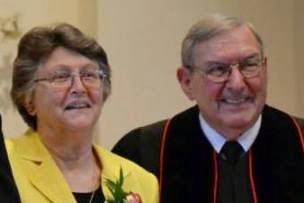From My Perspective - - -
The real test in life is to establish a Priority Check List. What should be first on the list? The definition of first in the British Dictionary is: “that which is before all others; the earliest, best, or foremost.” The American Dictionary defines first as: “being before all others with respect to time, order, rank, importance.” For some, the list might begin with family background, geographical preference, education, career, income, marriage, home ownership, etc. What if we began with a Biblical perspective in terms of where one’s priority list should begin. What would be of first concern? Why should that be a beginning point for most of us?
Let us begin with an assumption based upon the creation of man/woman in the image of God. This would present an entirely different focal point as a priority list was established. It is interesting that as Paul was summarizing his thoughts, he wrote in I Thessalonians 5:23 (NASB), “May God himself, the God of peace, sanctify you through and through. May your whole spirit, soul and body be kept blameless at the coming of our Lord Jesus Christ.” These words have the implication stating that we have a very high priority to seek. The God of peace is doing His work of sanctifying one totally and completely. The words “through and through” are validating the idea of a new creation taking place within one’s whole spirit, soul and body. It becomes obvious that Paul is emphasizing an inter-connection with the totality of one’s being. We cannot compartmentalize who or what we are as a God-created being. In Psalm 37:37 (NASB), the reassuring words from the Psalmist are: “Mark the blameless man, and behold the upright; for the man of peace will have a posterity.” This is the potential and possibility for all who are totally and completely subjected to the Lord’s cleansing and sanctifying work of grace.
When Jesus was giving His sermon on the mount, in the middle of His teaching, He raised an area that affects and impacts most people. We may call it “concern” about life and provisions to maintain it. Jesus chose to use the words “worry” and “anxious” about life, food, clothing in Matthew 6:24-34. He uses illustrations to establish His point and then narrows it all down to a particular and limited focus or priority one must have: “But seek first the kingdom of God and His righteousness, and all these things will be added to you” (Matthew 6:33 ESV). The words of Psalm 37:22-26 (NASB) establish this same truth: “For those blessed by Him will inherit the land…The steps of a (good) man are established by the Lord, And He delights in his way. When he falls, he will not be hurled headlong, Because the Lord is the One who holds his hand. I have been young and now I am old, yet I have not seen the righteous forsaken or his descendants begging bread. All day long he is gracious and lends, And his descendants are a blessing.” This truth resonates for the one who “seeks first the Kingdom of God and His righteousness.” It is at this point that one begins to learn, see and know the reality of “all these things will be added to you.”
There are other areas for inclusion on one’s Priority List, not the least of which is Prayer. In Psalm 63:1-4 (NASB) is the Prayer desire and commitment of the Psalmist: “O God, You are my God; I shall seek You earnestly (early); My soul thirsts for You, my flesh yearns for You, In a dry and weary land where there is no water. Thus I have seen You in the sanctuary,to see Your power and Your glory.Because Your lovingkindness is better than life, My lips will praise You. So I will bless You as long as I live; I will lift up my hands in Your name.” Paul would remind Timothy of this priority when he wrote in I Timothy 2:1-3 (NASB), “First of all, I urge that entreaties and prayers, petitions and thanksgivings, be made on behalf of all men, for kings and all who are in authority, so that we may lead a tranquil (peaceful) and quiet life in all godliness and dignity.This is good and acceptable in the sight of God our Savior.” We need to be guarded as we maintain a priority focus that is in accord with God’s Word and Will. Consider these things with me.



